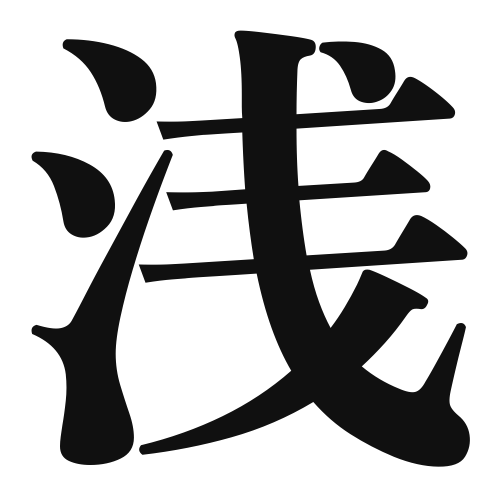1. Overview of Meaning
The kanji “浅” (pronounced “asa”) means “shallow” or “superficial.” It is often used to describe something that lacks depth, whether in a physical sense, like water, or in a metaphorical sense, such as knowledge or understanding.
2. Formation and Radical
Formation of the Kanji: The kanji “浅” is a phono-semantic compound (形声文字), which means it combines both a phonetic and a semantic component. The left part, “氵” (water radical), indicates a relationship to water, while the right part, “セン” (sen), provides the pronunciation.
Radical: The radical of “浅” is “氵,” which is a variant of the radical for water. This connection emphasizes the kanji’s association with shallow water.
3. Examples of Usage
Common Words and Phrases: Some frequently used words that include “浅” are:
- 浅い (あさい, asai) – shallow
- 浅瀬 (あさせ, asase) – shallow water
- 浅薄 (せんぱく, senpaku) – superficial or shallow in understanding
Example Sentences in Daily Conversation:
- この川は浅いです。 (このかわはあさいです。) – This river is shallow.
- 彼の知識は浅薄です。 (かれのちしきはせんぱくです。) – His knowledge is superficial.
4. Synonyms and Antonyms
Similar Kanji: A kanji with a similar meaning is “薄” (うす, usu), which means “thin” or “weak.” While both “浅” and “薄” imply a lack of depth, “薄” is more often used in contexts related to thickness or intensity.
Opposite Kanji: The antonym of “浅” is “深” (しん, shin), which means “deep.” This kanji is used to describe something that has significant depth, whether literally or metaphorically.
5. Cultural and Historical Background
Connection to Japanese Culture: The concept of “浅” is often reflected in Japanese aesthetics, where simplicity and minimalism are valued. Shallow water can symbolize clarity and transparency in various art forms.
Proverbs and Idioms: One common saying is “浅い知識は危険” (あさいちしきはきけん), which translates to “Shallow knowledge is dangerous.” This emphasizes the importance of deep understanding in any field.
